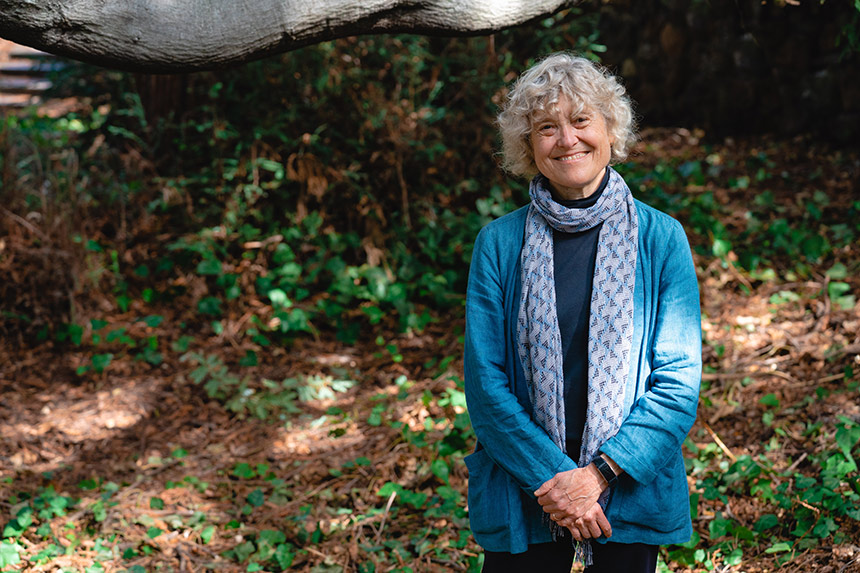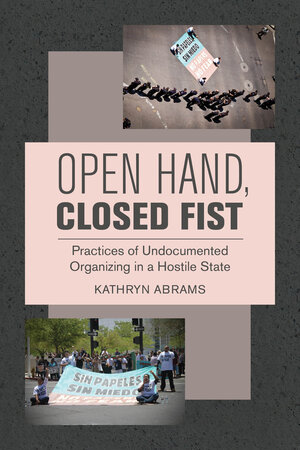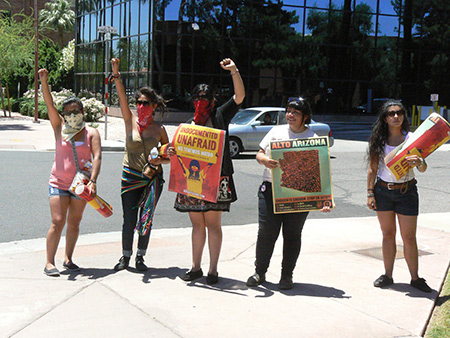
By Gwyneth K. Shaw
Professor Kathryn Abrams got the first glimmer of the idea that became her new book at a Berkeley Law faculty retreat, where she was presenting an almost-completed article. In it, she examined the role of emotion and social movements — ideas squarely in line with her extensive scholarship rooted in feminist theory.
Two of her colleagues, Professors Ian Haney López and Leti Volpp, suggested she look to a new story to frame her piece: The pitched battle in Arizona over anti-immigrant laws, particularly Senate Bill 1070 which authorized law enforcement officials to ask anyone they suspected of being undocumented to show their documents, in the course of any legal stop.
Abrams started digging.
“I quickly realized that this wasn’t a frame for my article, it was a new piece altogether,” she says. “Initially, I thought, I’m going to stumble onto a really great New Yorker article that’s going to give me a way into this, and I looked and looked and couldn’t really find anything useful. So I said to myself, ‘I wonder what would happen if I were actually down there?’”

One trip became many, and that article became a book, published by the University of California Press this fall: Open Hand, Closed Fist: Practices of Undocumented Organizing in a Hostile State. In it, Abrams tracks the efforts of organizers to fight anti-immigrant legislation and tackle related causes, including the ouster of Joe Arpaio, once Maricopa County’s notoriously hard-line sheriff.
The title comes from Carlos Garcia, then the leader of Puente-Arizona, a group Abrams spent extensive time with.
“The ‘open hand’ is the process of bringing people into community, and making them feel that there are others who share their experience. That shared experience can itself be a source of strength when you’ve been very isolated, because sometimes you’re afraid to leave your house because you don’t know whether you’ll come back or not,” she says. “So it can be a sense of personal empowerment, but it also can be a sense of collective protection. You learn that the same person who can make you feel at home by mirroring your experience can also put in a bunch of calls to Immigration and Customs Enforcement and supporters to get you out of detention if you get arrested during an action.
“The open hand makes you feel good — part of a community and part of an outward-facing project — and then the ‘closed fist’ is the practices that enable you to resist, to advocate for change, to become someone who can model public commitment to a political community and speak to decision makers and to members of the public.”
Open Hand, Closed Fist isn’t a political prescription: activists shape their political goals in response to the governmental policies they confront. What it describes is a method of organizing — a way of bringing to political action a group of people whose legal status and past experience seem to make them unlikely candidates for activism.
Back to school
The project was an intellectual as well as a physical journey for Abrams, who found herself needing to add new skills to her research toolbox to pull it off.
What initially drew her in was the stark contrast between those pushing for the new laws and the undocumented activists, something Abrams could see in videos she watched before her first trip to the Phoenix area.
“This was an emotionally heightened controversy. Some of the people supporting these laws about ‘attrition through enforcement’ were demonstrating some of the emotions that I would have expected to see. They were angry. There was a theorist of social movements, Bill Gamson, who once wrote that anger is the fire in the belly that motivates social movements. And boy, were they mad. They were yelling in people’s faces,” she says. “And the immigrants were not yelling back, but they were protesting back. They were talking back through organizing. And what they were projecting instead was this sense of resolve and dignity. They were carrying signs that said, ‘No person is illegal’ or ‘I am human’ or ‘I’m a worker, not a criminal’ — a very different emotional projection.”
Abrams turned to some of her colleagues, particularly at the Jurisprudence and Social Policy (JSP) Program, Berkeley Law’s interdisciplinary graduate program, to help chart a methodological course. She took a course from Professor Emerita Kristin Luker on interviewing, another with Professor Calvin Morrill on ethnographic observation, and got additional advice from Professor Catherine Albiston.
As she learned alongside JSP students, Abrams also began to connect those skills with her existing scholarly practices.
“While the methods were new, and the focus on immigration was new, a lot of the questions were questions that had appealed to me in my feminist work,” she says.
Interested in storytelling and its complicated relationship to the law since the 1990s, Abrams has also sought to examine how even constrained groups can engage in self-assertion or self-direction through her work on feminist theory.
“These were some of the most constrained people you can imagine engaging in really creative acts of self-assertion, and then there was the emotional element,” she says.
Once Abrams got to Arizona, and started doing interviews, and observing protests and organizational meetings, she began to realize emotion was just one part of the tale. Another question she wanted to answer: what function the storytelling served for the activists.
“These activists experienced legal and political disadvantage like outsider groups that I had studied — like different groups of people of color, like women, or like queer activists, but they actually had a kind of challenge that most members of those groups didn’t have, which is they didn’t even have formal citizenship,” Abrams says. “They had some rights, because the Constitution guarantees free speech rights against the government, but not to a particular group, or it guarantees equal protection rights to persons. So they had certain legal rights that they could claim in a litigation posture. But if they were demonstrating politically, they lacked a relationship to decision-makers, they lacked a formal claim to be part of the polity. Groups that were outsiders that I’d looked at before, despite profound disadvantages, had a formal relationship to the polity. That was another dimension to look at.”
It was right about then when Abrams realized the project would be far more than an article, or even multiple papers. She was in book territory.

Once in Arizona, Abrams began slowly embedding herself into organizing groups: Sitting and listening, doing interviews with leaders, watching protests, and observing activists knock on doors and tell their stories to residents.
“There was a very self-aware effort to refrain from hyperbolic tactics. As I mentioned before, even when opponents voiced anger or contempt toward them, immigrants were not screaming back,” she says. “I think that they thought that in a lot of moments, actions speak louder than words. And so they tried to answer that kind of escalation of rhetoric with modeling of particular kinds of behavior.
“So you say that we’re just a burden on the economy? We’re going to show you that we’re very hard workers, that we give and don’t take. You say that we are outsiders to the political system? We’re going to register voters, and we’re going to engage in a 60-mile march into the desert to protest the detention of immigrants, to show you just how committed we are to revising this political system. In some cases, we’re going to let ourselves get arrested, even when it might lead to deportation, to protest what’s happening. It was modeling that they were not what people said.”
Clearing hurdles
It took some time for Abrams to overcome various hurdles to her research. As a white woman, she was instantly identified as an outsider; and her academic credentials, far from enabling access to activists, were occasionally viewed as an impediment. She also spoke no Spanish when she began her research.
“Take a group like Puente. Every time I walked into their space and asked a question in English, I violated their linguistic norms. Why should they trust me?” she says. “I had this idea that in the same way that they let their actions speak for them I was going to let my constancy at my work be an instrument for trying to gain their trust. And I just kept coming back. I was there for between four and five years.”
After two years of following Puente’s efforts, she still hadn’t landed an interview with Garcia. Abrams began to wonder how she could tell the story without him. So one day, she approached him and asked if he would speak to a law school class she was teaching on the immigrant rights movement.
“I didn’t particularly interest him, per se, but my students and the opportunity to influence them did,” she says. “So the first interview I did with him was in my class, by Zoom. And then we got to know each other a little bit, and more interviews followed.
“I constantly had to think about things like that. But I think coming back and coming back and coming back, was the primary vehicle I used.”
Abrams continues the Spanish study she began at the start of the project, and thinks her future work will continue to be informed by her work on the book. She’s particularly intrigued by thinking about immigrants in the context of her feminist interests. Abrams is teaching a class this fall on the unfinished business of the #MeToo movement, and much of it involves immigrant workers.
“Some groups of workers that were the most neglected by the movement — farm workers, janitorial workers, hotel housekeepers — include many, many women of color, a lot of them immigrants, a substantial number undocumented,” she says. “And the way that sexual coercion and sexual violence is allowed to pervade those environments has a lot to do with the perceived and actual diminution of recourse that those workers have because they’re constantly under the threat of deportation. So that’s a really interesting area to me.”
Another angle is the reproductive justice movement, further animated this year by the U.S. Supreme Court’s Dobbs decision overturning Roe v. Wade and the constitutional right to abortion. Many of those who will suffer most from the change are women of color and lower income women, some of whom are immigrants. If they are going to be part of a coalition to respond to Dobbs, their challenges — not only in securing abortions, but in maintaining reproductive health, and raising families with material sufficiency and dignity — should be part of the agenda as well.
Abrams says she loved writing the book, and is eager to keep using the new research skills she acquired working on it.
“It was the most energizing thing I’ve done in my career,” she says. “It was a midlife transition that, for me, was incredibly exciting and generative.”